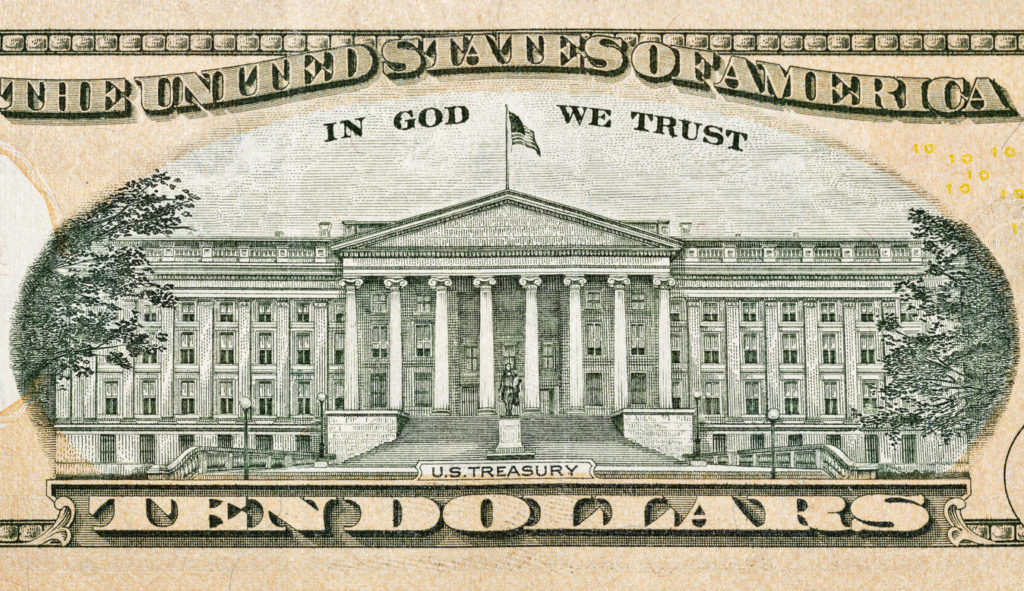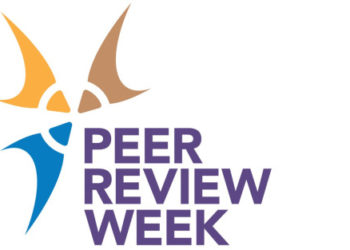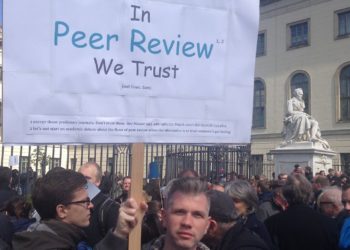We continue our Peer Review Week 2020 celebrations with this guest post by Dawn Durante, Editor in Chief at the University of Texas Press. Dawn’s master’s thesis was on trust, peer review, and ebooks, and she is a member of the editorial collective for the Feeding the Elephant scholarly communications forum on the H-Net Book Channel. You can follow her on Twitter @dawnd.
“I’m a trust fund baby, you can trust me.” – Leslie Odom Jr. as Aaron Burr in Hamilton
“Criticism legitimizes your work.” – Leslie Odom Jr.
Close your eyes, and visualize a time before debit cards, or Venmo, or Apple Pay. Imagine reaching into your wallet and pulling out a paper version of money once commonly used for transactions called cash. In your mind’s eye, look at the back of that money. What do you find? The word “trust” in a phrase so popular, it was the basis for The Scholarly Kitchen post announcing this year’s Peer Review Week theme, “In Peer Review We Trust.” With United States currency, the very basis of each economic transaction speaks to the deeply embedded entanglement between finance and trust. For Peer Review Week 2020, we devote our attention to trust at work in the many facets of peer review. But, what is the economics of trust? And how do overlapping economies of trust impact peer review?

While it may not be romantic, publishers — for-profit and non-profit alike — are in the business of transactions. And, while not every transaction requires an exchange of money (e.g., the download of a free ebook) there is a presumed set of characteristics to each transaction: a producer (publisher), provides a commodity (publication), to a consumer (reader, sometimes via a vendor). At work in every transaction, whether it is buying produce from the grocery store or obtaining a monograph from your favorite university press, is trust in the legitimacy of a product. In scholarly publishing, trust is achieved through the legitimate publication of research and argumentation, and the peer review process is fundamental to achieving that legitimacy.
Peer review provides the assurance that a publication from a scholarly publisher is trustworthy, and achieving this trustworthiness requires integrity in all the critical mechanics of peer review. It both requires trust in the process and fosters trust in the publications produced. While there are some universalities with peer review, there are differences between books and journals and STEM and HSS. The Association of University Presses has made progress toward codifying the expectations for the book peer review process in its Best Practices for Peer Review: AUPresses Handbook for Monograph Publishing, which are intended to make this process more transparent. But very often, an author’s acquiring editor is the most sustained resource for information on monograph peer review, particularly as the project unfolds, and so the relationship between an author and an editor is also an essential locus of trust.
An editor should be trusted to shepherd an author and their book through the publication process. An author — even an experienced one — relies on an editor to demystify this process as it unfolds. However, it may not be possible for an editor to be fully transparent due to the promise of anonymity in peer review. Book peer review is typically single blind: reviewers generally know the author of the manuscript, but the author will not know the identity of the reviewers unless they voluntarily disclose their name. This means that reviewers must trust publishers not to reveal their identity if they’ve requested anonymity. Double blind peer review, which is more common in journals publishing, means that authors and reviewers identities are both unknown to one another. For some book authors, especially those writing from or about marginalized identities or communities, the single blind book review process can feel particularly precarious. So, an author must also trust that an editor will enlist reports from readers responsibly and inclusively.
Book peer review also typically includes the economics of an honorarium payment, which is either a modest payment in money or copies of the publisher’s books. Just as with the purchase of a book, there are transactional dynamics at work in every state of peer review in which, at its most basic, a reviewer (producer) provides a report (product) to an editor (consumer). Here, the editor tacitly legitimizes the reports, because the identity of the producer is unknown to the author, who is a consumer of the report, along with the editor — and, by extension the publisher, who uses it to make decisions about the publishing process. With a report in hand, an editor must be trustworthy in helping an author to understand the steps following peer review. Should those steps involve moving forward in the publishing process, an author trusts their editor’s guidance on how to navigate the peer reviews in a way that serves their project and the larger scholarly community.
While an author entrusts their editor with the peer review process–not something to take lightly given the essential function of peer review for a scholar’s career–a publisher also trusts the editor to be a responsible steward for the press, as every publication constitutes a significant investment of resources. As conceptions of what constitutes a publication broaden, publishers seek ways to establish trust in innovative publishing technologies, often requiring negotiations of new peer review processes. An important example is open peer review in the humanities, often discussed in conjunction with digital humanities. Likewise, projects like Brown University’s Mellon-funded Digital Publications Initiative, which “facilitates the creation and validation of digital scholarly monographs,” support the work of rigorous peer review with appropriate attention to new modes of publication. Processes that rigorously critique traditional elements of a project (like argument and scholarship), as well as nontraditional elements (like navigability of a born-digital project), serve to effectively legitimize new publishing technologies.
Peer review is the bedrock of scholarly publishing, but the value of critique isn’t siloed within the walls of the ivory tower. After Disney+ started streaming Hamilton on July 3, 2020, a whole new audience had access to it, which prompted new discussions and critiques of the hit Broadway musical. When asked about these responses, Leslie Odom Jr. responded that “criticism legitimizes your work.” Publishers have a massive amount of work legitimized through a significant investment in the resources peer review requires; readers have a need for reliable answers amid Twitter bots and relatives who keep posting fake news on Facebook. As the academic publishing industry works to maintain its own economic viability and university presses raise awareness for how they support quality work on essential discussions, the economics of trust helps peer review to serve a world in need of trustworthy resources.
These thoughts on trust in peer review were informed by a piece by economist Partha DasGapta, Trust as a Commodity; and by Christine Borgman’s Scholarship in the Digital Age: Information, Infrastructure, and the Internet, particularly her discussions of legitimization.
Discussion
2 Thoughts on "Guest Post — The Economics of Trust in Peer Review"
With all our discussions on the value and benefits of peer review and how the world cannot operate without it, are we just a group of people with vested interests telling each other how important we are? Where is the work that is reaching out to Joe Public and promoting the understanding of peer review – its attributes, challenges and essential nature as a system? Even Peer Review Week is a self-promoting industry concept. Where is the outreach work that is focusing on changing attitudes to science that is based on peer review? Most Facebook/Twitter/Google users have no idea about peer review and that it is this that can make the difference between false news and validated news.
I completely agree that outreach to the public is critical – Karin, Jasmine, and I mentioned this (as well as the need for better public understanding of the whole scientific process) in our post on Monday. I actually think there has been some progress – looking back 15-20 years, it was rare to see a mention of peer review in the mainstream media, but it’s now commonplace for journalists to refer to articles as being peer-reviewed as a shorthand for it being a legitimate source of information. That’s not to say we don’t still have a lot of work to do – especially in our current era of fake news and misinformation. This year, the Peer Review Week organizing committee had a specific goal of engaging with journalists and librarians as a way of reaching out to researchers and the general public. I’m not sure yet how successful we were, but I am sure that this will continue to be a goal for the group in future!


